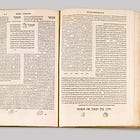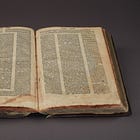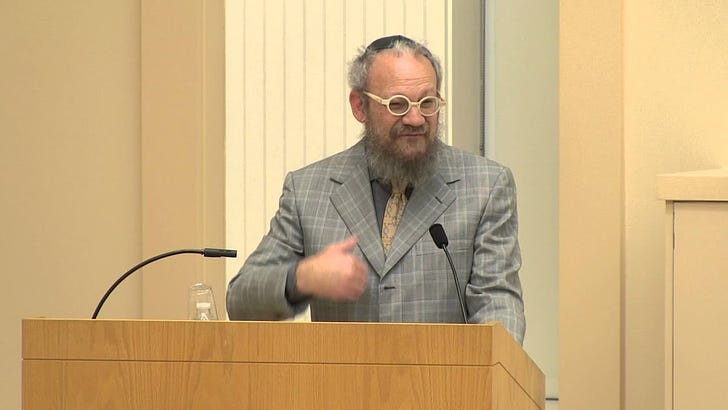How and How Not To Read The Talmud (III): BT Sanh. 93b.
In which the Mishnah that the Gemara is commenting on is important, as is basic close reading; history arises, and we learn about Rabbinic Messianic expectation and its olfactory component.
Part three of the ongoing series, part one and two can be found here:
here we start reading, beginning with the Mishnah.
Feel free to read along with me as there is a translation of the entire Babylonian Talmud, and almost all the material I cite here, available for free on Sefaria. However, note firstly that this Bavli translation includes glosses and is entirely Orthodox (as is the other widely available one from Soncino Press) – the gloss (explanatory material that is not in the original text) is unbolded, whereas the words translated from the text are in bold. The other material on Sefaria, however, does not always make that distinction. And, where necessary for accuracy, I have altered some of the quoted translations to be closer to the literal Hebrew (less so with the Aramaic as I am not confident enough my readings are better, but occasionally there as well). Links will be provided to all sources.
The first citations are Sanhedrin 93b and 98b, both from the same Gemara so they will be treated together.
Firstly, from what I have said above, knowing exactly what Mishnah the Gemara you’re reading is commenting on is probably a good idea. This one happens to be on Sanhedrin 10.1 (cited in Bavli starting on 90a). The Mishnah in question is as follows:
All Israel have a portion in the world to come, as it is said, “and your people, all of them righteous, shall inherit the land for ever; They are the shoot that I planted, the work of my hands that I glorify” (Isaiah 60:21). And these are the ones who have no portion in the world to come: the one who says the resurrection of the dead is not from the Torah, that Torah is not from the Heavens, and an epikoros. Rabbi Akiva says: “Also one who reads non-canonical books and one who whispers [a charm] over a wound and says, ‘all of the diseases I placed upon the Egyptians I will not place upon you: for I [the Lord] am you healer’” (Exodus 15:26). Abba Shaul says: “Also one who pronounces the [divine] name as it is spelled.”
Note here that we have a connection between Epikorosim (אפיקורוסים, apostates, i.e. those who leave the Jewish religion)1 and eschatological punishment, which includes those who read “non-canonical books” (חיצונים, literally “outside”, meaning variously profane, interpretively incorrect or separatist). There is interesting stuff about Jesus and pronouncing divine names in the later Toldot Yeshu, and the dangers of minim (מינים, heretics) who claim to heal in the name of Jesus are present even in the earliest Rabbinic material. Shaye Cohen provides extensive lists of anti-Christian polemics in Mishnah and Tosefta.2 The most relevant for these purposes are in Tosefta Hulin 2:22. This bears keeping in mind, as the Gemara, logically, must be compiled after the Mishnah, as it is dependent on it. This concern for religious correctness is clearly polemical against religious opponents, and this description covers multiple aspects evident in Christianity, of which the Rabbis were aware. Christians did indeed read non-canonical books, by Jewish standards. The Rabbis often cite Ben Sira (as in the BT Chagigah citation above), but in response to this Mishnah its prohibition is debated (BT Sanh. 100b), and we know it was preserved in the Septuagint that was used by Christians. And, as found elsewhere, heretics (most probably Christians) argued that the Ten Commandments were spoken directly by the Divinity from Mt Sinai, but the rest of Torah was not divinely decreed (see TY Berakhot 1:5:4, the word there is מינין, the aramaicized spelling of מינים). This Mishnah is also worth comparing to Paul’s words in Rom 9-11. While it is difficult to conclusively assert dependence, the parallels are striking.
Pages of the “non-canonical book” of Ben Sira from the Cairo Genizah.
The first of the cited passages is Sanh 93b. This follows in the discussion of the above Mishnah (and thus the framing of the Gemara is dependent on it), moving from resurrection of the dead, demonstrated from Ezekiel in the valley of dry bones (Ezekiel 37), to the story of the fiery furnace in Daniel 3, which occurred, according to the Bavli, on the same day. This discussion turns to righteousness, punishment and blessings, which brings us to the Book of Ruth, and thus to Ruth’s great-grandson, David. Ruth is promised blessings, one of which is David, who is also is promised blessings, and he is distinguished against the wicked who receive curses. One of David’s blessings is the Messiah, who in turn is to also receive certain blessings. This starts with the statement regarding Ruth:
Six sons are destined to emerge from her who would each be blessed with six blessings, and these are they: David, and Messiah, Daniel, Hananiah, Mishael, and Azariah. David, as it is said: “And one of the servants answered and said: Behold, I have seen a son of Yishai [Jesse, the father of David] of the house of Bethlehem who knows to play, and is a fine warrior, and a man of war, and prudent in speech, and a comely man, and the Lord is with him”
Note that the passage opens with an uncredited statement. There is not “Rabbi x says” here. This is the Stam. This entire discussion is embedded in this voice, curated by it, and, as we shall see, guided by it. The discussion moves to David, and then the Messiah. The entire elaboration finding prooftexts for these blessings is the Stam following a single quote from an Amora. After a little more digression, we get six blessings for the Messiah:
as it is said: “And the spirit of the Lord shall rest upon him, the spirit of wisdom and understanding, the spirit of counsel and might, the spirit of knowledge and of the fear of the Lord” (Isaiah 11:2); and it is said: “And his delight [vahariḥo] shall be the fear of the Lord” (Isaiah 11:3).
Next is the passage in question, addressing the elaboration of the sixth blessing in the following verse:
Rabbi Alexandri says [the word hariḥo] teaches that he [the Deity] burdened him [the Messiah] with מצות and sufferings like millstones [reiḥayim]. Rava says [that hariḥo means he will] smell [demoraḥ] and judge, as it is said: “And he shall neither judge after the sight of his eyes, [nor decide after the hearing of his ears] and with righteousness shall he judge the poor, and decide equity for the meek of the earth” (Isaiah 11:3–4).
First, note that there is no citation of Isaiah 53 here. The linking statement is the word Hariho in Isaiah 11:3, which continues into another citation of the same passage, continuing into the next verse. The discussion is entirely about Isaiah 11 covering verses 2-4.
However, this passage is impossible to understand without knowing a couple of things about Hebrew and Aramaic (I promise, this is fairly simple). The alphabet used to write these texts only has consonants. It doesn’t have vowels. The previous sentence, written like this, would read “t dsnt hv vwls”. If you look at a Bible, prayerbook or similar text, there will be little markings above and below the letters. These are nikkudot, a system added to these texts around the 10th Century CE to tell you how to pronounce them. But many texts don’t have them, and most were originally written without them. The language is largely structured so you don’t need them, and most literate scholars don’t need them, and neither do speakers of modern Hebrew. But if that doesn’t sound confusing enough, sometimes the same set of letters can at times be pronounced different ways to mean completely different things. The Rabbis (who lived before any texts had vowel markings) do that a lot and this is what they are arguing about in this passage.
One such ambiguity, and possible pun at work with the word מצות, which can be read as two different words depending on how you vocalize it – mitzvot, “commandments” but also matzut, “strife” or “contention”. It looks like it may mean “strife” in the first statement, but in the following statements (at least by my reading) it makes more sense to read it as “commandments”. There are other passages in which David is closely associated with the commandments, starting in the bible itself, but expanded greatly across the rabbinic corpus, where he is adorned with them, and finds himself (almost) naked of them in TY Berakhot 9:5:21. As king he is described as judging the people according to them, which fits with the next description of the Davidic Messiah as having supernatural powers of discernment. Rabbi Alexandri is referring to the previous citation of Isaiah (not 53, but 11) and apparently reading “his delight”, hariḥo (הריחו) as “his millstone” reiḥo, stated in the plural as reiḥayim (ריחיים). Rava responds saying no, it is not this but instead a word that is spelled the exact same way (and more grammatically correct) that means “he smelled him” (hericho),3 making the verse read “he will smell in him the fear of the Lord”, and not see or hear this. This, tied to mitzvot (ironically itself being a contention, a matzut) brings us into the context, which is the identification of a false messianic claimant. Funnily enough, tying it all together, the requirement is to be able to smell if people are or are not performing the commandments, the mitzvot:
Bar Koziva [i.e. the leader of the 2nd revolt, who claimed to be Messiah and was identified as such by Rabbi Akiva] ruled for two and a half years. He said to the Sages: I am the Messiah. They said to him: With regard to the Messiah it is written that he [will] smell and judge, let us see ourselves whether he [can] smell and judge. Once they saw that [he did] not smell and judge, [they] killed him.
This continuation (which is the Stam, the curatorial voice that has presented this entire discussion, aimed seemingly toward this conclusion, there appears to be no continuation of the attribution of Rava) clearly is a reflection on the 2nd Jewish Revolt, around the middle of the 2nd Century CE, but further, it is explicitly about what is required of a messianic claimant, and one who claimed such a role being refuted, and subsequently killed (contra the gloss provided on Sefaria, it appears also to be claiming the Rabbis are responsible – this itself implies a late tradition). There is nothing here that verifies any of Carriers claims: no citation of Isaiah 53, no belief in a cosmic figure, nor a suffering and dying redeemer, there is just a false messiah who dies, and does so because he does not have a divine sense of smell. And it doesn’t claim to be any earlier than the 2nd Century. The two Rabbinic figures here (Alexandri and Rava) are both Amoraim, meaning 3rd-5th Century, presented as providing this exegesis in order to comment on an event that was historical to them.4
I am confused by this citation, but it is the only passage on this folio which that appears connected to what Carrier is talking about. It is also very difficult to understand in translation (the transliterations provided in the Steinsaltz translation are not adequate, Soncino is slightly better, but by way of extensive explanatory notes) – the argumentation is not simple even in the original. The word translated by me as “sufferings” and by Steinsaltz as “afflictions” (the two definitions given by Jastrow)5 is suffering in a more general sense. It appears to be a result of the “burdening” as the metaphor appears to be a work animal like an ox, used in mills, which is a metaphorical description of the “fear of the Lord” in the verse. That the root יסר in Biblical Hebrew is associated with chastisement and discipline fits the context of commandments.6 Perhaps it’s also conceptually parallel to the Baraita introduced in BT Berakhot 5a, or reflecting the same ideas as Sifrei Devarim 32. But the focus is clearly on Isaiah 11 and deriving the ability to smell from it. The passage seems to be a complete unit, composed together, providing a prooftext for the ability Bar Koseba did not have in the next section. I do not see a reasonable way to assert any constituent part existing outside of this context, much less independent of the exegesis of Isaiah 11. Even if the exegesis was prior to the context it is presented in, there is both no reason to believe it to be pre-Rabbinic, and no connection to Isaiah 53.7
It is additionally very strange to cite this rather than the Messiah story in Sanh. 98a, but this is uncited so will not be treated here, there are fine treatments of this by Daniel Boyarin8 and Martha Himmelfarb.9
Next post:
Bibliography
Boyarin, Daniel. The Jewish Gospels : The Story of the Jewish Christ. New York: The New Press, 2012.
Brown, Francis, Edward Robinson, S. R. Driver, Charles A. Briggs, Francis Brown, and Wilhelm Gesenius. Brown, Driver, and Briggs Hebrew and English Lexicon of the Old Testament. Oxford: Oxford University Press, 1902. <https://www.sefaria.org/BDB?tab=contents>.
Cohen, Shaye. From the Maccabees to the Mishnah. 3rd ed. Louisville, KY: Westminster John Knox Press, 2014.
Himmelfarb, Martha. Jewish Messiahs in a Christian Empire: A History of the Book of Zerubbabel. Cambridge, Massachusetts: Harvard University Press, 2017.
Jastrow, Marcus. A Dictionary of the Targumim, the Talmud Babli and Yerushalmi, and the Midraschic Literature. 2 vols. London, New York: Luzac & co.; G. P. Putnam's sons, 1903.
O'Neill, J.C. "The Mocking of Bar Kokhba and of Jesus." [In English]. Journal for the Study of Judaism 31, no. 1-4 (01 Jan. 2000 2000): 39-41. https://doi.org/https://doi.org/10.1163/157006300X00035. https://brill.com/view/journals/jsj/31/1-4/article-p39_3.xml.
This is a Hebrew transliteration of the Greek term “Epicureans”, but in every context it is used it refers to those who abandon Jewish custom. The Rabbinic literature in which it first occurs clearly equates Hellenization with apostasy, and the term quickly becomes synonymous with this, regardless of whether there is a direct relationship to Greek culture, much less the actual philosophical school the word is derived from.
Shaye Cohen, From the Maccabees to the Mishnah, 3rd ed. (Louisville, KY: Westminster John Knox Press, 2014), 241-8.
i.e. הֵרִיחוֹ, the hiphel third masculine perfect form of רוח with the masculine object suffix, modified in context into the imperfect by the vav-consecutive, which works grammatically, when Rabbi Alexandri’s reading doesn’t as you can’t have a definite article and a possessive suffix, as a noun with a suffix like this is already grammatically definite. The grammar of the original verse is ambiguous, allowing for the word to be read as either a noun (as in most modern translations) or a verb (as Rava does here, and as to some older translations).
There are two Amoraim with the name Alexandri – one earlier (possibly 3rd Century) and one of the later fourth generation. The later one matches up with Rava (early 4th C) so the claim that this is an accurate record a historical dispute would date it to the fourth century.
Marcus Jastrow, A dictionary of the Targumim, the Talmud Babli and Yerushalmi, and the Midraschic literature, 2 vols. (London, New York: Luzac & co.; G. P. Putnam's sons, 1903)
As per BDB: Francis Brown et al., Brown, Driver, and Briggs Hebrew and English lexicon of the Old Testament (Oxford: Oxford University Press, 1902), <https://www.sefaria.org/BDB?tab=contents>. A derivative form from this root is present in Isa 53:5, מוסר, but this does not mean suffering either, it means discipline, chastisement, or even education. It is not uncommon for derivative forms of semetic trilateral roots to have transformative meanings.
Even if this highly speculative claim were granted, there is still little reason to think that it’s pre-Christian. Indeed, it has been interpreted as anti-Christian in this paper, J.C. O'Neill, "The Mocking of Bar Kokhba and of Jesus," Journal for the Study of Judaism 31, no. 1-4 (01 Jan. 2000 2000), https://doi.org/https://doi.org/10.1163/157006300X00035, https://brill.com/view/journals/jsj/31/1-4/article-p39_3.xml. https://brill.com/previewpdf/journals/jsj/31/1-4/article-p39_3.xml
Daniel Boyarin, The Jewish Gospels : the story of the Jewish Christ (New York: The New Press, 2012), 153.
Martha Himmelfarb, Jewish messiahs in a Christian empire: a history of the Book of Zerubbabel (Cambridge, Massachusetts: Harvard University Press, 2017), 66-8.





